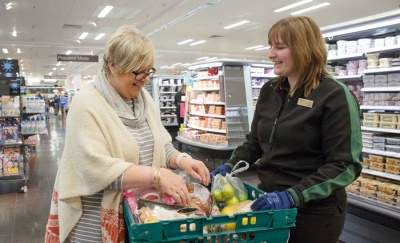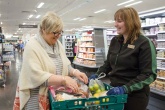Survey reveals what’s holding back UK food redistribution
 Food charities are being prevented from helping more people with redistributed surplus food due to a lack of essential infrastructure, a study has found.
Food charities are being prevented from helping more people with redistributed surplus food due to a lack of essential infrastructure, a study has found.
Neighbourly, a social network that aims to facilitate social good and works with Marks & Spencer to find charitable homes for the retailer’s unsold goods, has published the results of a survey of 218 charities and volunteer organisations involved in redistributing surplus food.
The survey, conducted in June 2016, found that while 30,000 people rely on these charitable organisations every week, they are prevented from helping more vulnerable people in the UK due to a lack of infrastructure and storage. Already, the organisations provide 1.56 million meals per year throughout the UK.
The survey found that 47.8 per cent of organisations need more storage space, 40.7 per cent need transport to collect donations, and 36.8 per cent lack refrigeration capabilities. It was reported that just 28.7 per cent of organisations need an improved supply of food contributions.
While bread and vegetables are widely accepted (98.1 per cent and 96.2 per cent respectively), the survey revealed that many organisations are incredibly limited in the food products they are able to redistribute to those in need. Only 68.1 per cent accepted dairy products, 63.3 per cent accepted ‘on the go’ food such as sandwiches, and just 59.5 per cent accepted meat products.
The results of this survey contrast somewhat with a plea for more food donations made by food redistribution charity Fareshare last month, which said that there was an ‘urgent’ need for more food companies to redistribute their surplus produce. FareShare said that although it distributed enough surplus food to provide a record 18.3 million meals in 2015/16, there is the potential for 800 million meals to be made from unused food from retailers.
While it noted that a significant proportion of charities require more consistent contributions, the Neighbourly survey concludes that the main challenge faced by a large proportion of these charities is a lack of infrastructure available to organisations to collect and safely store the food they are offered, rather than a lack of donated food.
Concerns regarding the safe handling of certain food products, such as meat and dairy, could also be a contributing factor to the reluctance of organisations to accept certain foodstuffs.
The survey is published to coincide with the start of a review of the ‘Guidance on the application of date labels to food’ at a cross-industry workshop hosted by the Food Standards Agency and Neighbourly, with representatives from the Food Foundation, WRAP, food charities and major UK food retailers. The review, which started this week, will explore whether improved food safety labelling and better education and guidance on the safe handling of food will increase the volume of food used within the voluntary sector.
‘We need to address the huge gaps in both capability and capacity’
Since its launch in December 2015, Neighbourly Food has assisted in the redistribution of 231 tonnes of surplus food to help people across the country. Despite the impact the programme has made, it says there is still more that can be done in terms of improving the capability of organisations to accept, store and redistribute surplus food.

“We need to help these charities and community projects get whatever is needed – whether that means funds, volunteer drivers to deliver food, consistent food donation supply, or the right tools and infrastructure – in order to better serve those in need.”
David Moon, Head of Food Sustainability at WRAP, commented: “WRAP’s recent quantification research has highlighted the opportunities to increase food surplus redistribution. These new insights build on this work, detailing some of the barriers that redistribution organisations face. Through Courtauld 2025, we will work with organisations including the FSA, Defra, and redistribution groups such as Neighbourly, to seek ways to overcome barriers, including better guidance on date labelling. This will deliver an important step in reducing food waste.”
More information about Neighbourly can be found at the enterprise’s website.









